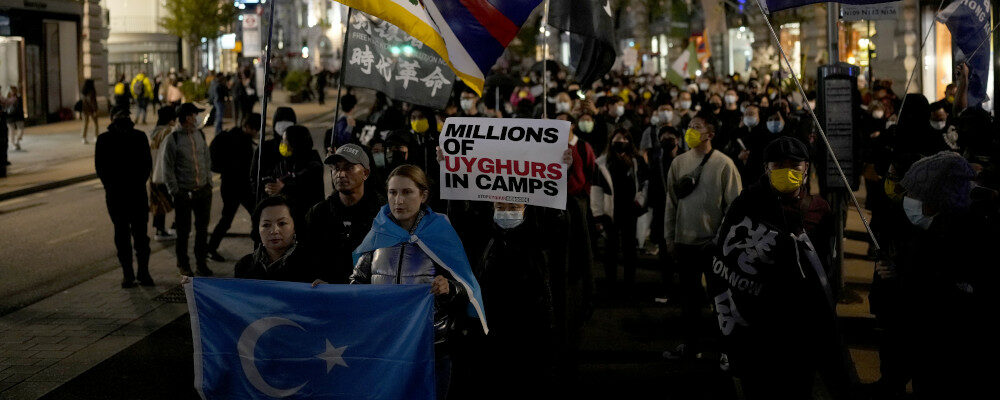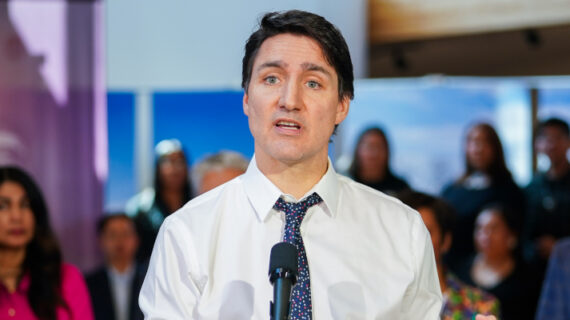The Canadian Ombudsperson for Responsible Enterprise announced today that it is launching investigations into allegations that two Canadian companies, Nike Canada Corp. and Dynasty Gold Corp., benefitted from the use of Uyghur forced labour in their supply chains and operations in China. This represents the first time that the office has undertaken such an investigation.
To help understand the investigation, The Hub is pleased to publish an exclusive Q&A with leading expert Sarah Teich from Fall 2022. She is a Canadian-based lawyer and senior fellow at the Macdonald-Laurier Institute where she studies international law, national security, terrorism, and human rights.
In 2022, she authored a report published by MLI, the Canadian Security Research Group, and the Uyghur rights advocacy project, entitled Justice for Uyghurs: Assessing Legal Frameworks and Options for Action. The report, among other things, sets out legal options for the international community to hold the Chinese Communist Party’s party accountable for what Teich describes as “crimes and abuses against the Uyghurs in Xinjiang.”
The transcript has been edited for length and clarity.
SEAN SPEER: Your paper opens with a blunt statement: “It is well established that the crimes being committed by the Chinese Communist Party’s party against the Uyghurs in Xinjiang, constitute genocide pursuant to the 1948 UN Genocide Convention.” Let’s start with a two-part question. First, what is genocide? And second, what is the CCP doing to the Uyghurs that would meet this definition?
SARAH TEICH: Genocide is defined in the UN Genocide Convention. It’s any one of the following five actions when coupled with the intent to destroy in whole or in part, an ethnic, national, racial or religious group. It can be killing members of the group, causing serious bodily or mental harm, deliberately inflicting conditions of life calculated to destroy the group, and posing measures to prevent births, or forcibly transferring children of the group to another group.
Now as to the second part of the question, that has been established by so many people already and so many institutions when it comes to the Uyghurs and China, the point of contention is now more matter of whether it is just one of the five acts or all of them that are being committed.
SEAN SPEER: If indeed a genocide is being carried out, and you make a persuasive case there and in the paper that it is, what do you think of the international community’s response?
SARAH TEICH: The international community has done some things, but it hasn’t been enough. Under the Genocide Convention, every state party to that convention, which is almost every country in the world, has an obligation to prevent genocide. Countries are really not living up to their obligations under that convention. That even applies if you disagree that it’s a genocide. The obligation of UN members kicks in even if there’s a serious risk of genocide.
SEAN SPEER: One of the most interesting arguments in the paper is that there are a number of international and domestic options for governments to respond, including criminally prosecuting perpetrators in domestic courts using universal jurisdiction laws. Talk about some of your recommendations.
SARAH TEICH: I’ll try not to go through all of them, but maybe pick a couple favourites. The International Court of Justice is, I think, one that we should be pursuing, as well as the International Criminal Court because they target state level responsibility. The difficulty with the ICJ is that China has opted out of the specific article that would enable us to go to the ICJ without its consent. But there’s a legal option to argue there that China’s reservation is contrary to the object and purpose of the treaty, and therefore is of no force in effect. It would be somewhat of a novel legal argument. It’s been tried once before actually and failed. But it’s still something that I think would be worth trying.
Then sanctions. Yes, we have imposed sanctions, but we haven’t imposed enough sanctions. There’s more that can be done. In January 2022, for instance, the Uyghur Rights Advocacy Project submitted a list of 10 names to Global Affairs Canada’s sanctions division, asking for sanctions against those officials, and only one of those names was ultimately included in the list. So, I believe more can be done.
There are other domestic tools that are particularly important when we’re talking about China, because as much as these international mechanisms do exist, they’re made really difficult by Chinese influence at the international level, particularly their position on the UN Security Council or human rights bodies. There’s potential for civil lawsuits though that those are made complicated by sovereign immunity. But there’s also criminal prosecutions. The International Criminal Court is not the only option for prosecuting international criminals. We can actually do that domestically in Canadian courts, which not a lot of people know about, using universal jurisdiction cases.
Universal jurisdiction exists for atrocity crimes, which is the umbrella term we use to describe genocide, war crimes and crimes against humanity. It’s enshrined in Canadian law as part of the Crimes Against Humanity and War Crimes Act. It’s been used to prosecute Rwandan war crimes in Canadian courts. The limitation is that the perpetrator would need to be physically present here. They don’t have to be a Canadian resident; they could be here as a visitor, but they must be here. So theoretically, if a CCP official who has responsibility for the crimes being committed, comes to Canada on a visit, he can be arrested and criminally prosecuted.
SEAN SPEER: Let’s discuss the economic and other factors that would influence government decision-making. What role should business interests or economic risks play in how the Canadian government responds to these issues?
SARAH TEICH: The business angle is interesting, because this is something I’ve been working on recently with a couple of different clients. Something that gets lost sometimes in those discussions is that businesses also have obligations to respect human rights. They’re obliged for instance not to have their operations abroad adversely affect human rights. The role of the Canadian Ombudsperson for Responsible Enterprise is mandated to monitor and investigate these types of cases. So, businesses are just as much on the hook for this as well.
SEAN SPEER: In that vein, do you want to just unpack the paper’s thinking and analysis about the issue of forced labour and the extent to which both Canadian policy but also Canadian business practices ought to be cognizant of what’s going on in this regard in Xinjiang?
SARAH TEICH: First, labour is a huge issue. There are so many research papers that have come out, especially over the last two and a half years, documenting the problem. The Australian Strategic Policy Institute named several dozens of multinational corporations that have Uyghur forced labour in their supply chains. Laura Murphy has done excellent research on this as well.
There have been so many industries and firms caught up in this. It’s a huge problem because we’re not just not doing enough but we’re actually profiting off of the crimes if we continue to buy goods from those companies that use forced labour. That really needs to be tackled.
There are some bills that have been proposed now in Canada to tackle forced labour. S-204 which was put forward by Senator Leo Housakos, is my personal favourite. It actually creates a ban, which, in my opinion, is more effective than other bills that would just create reporting obligations.




